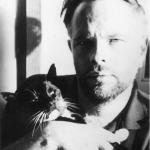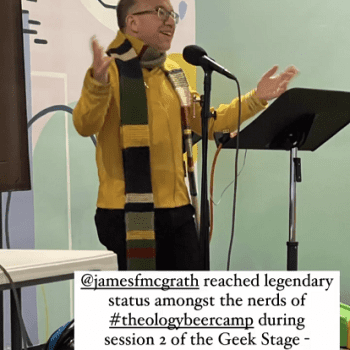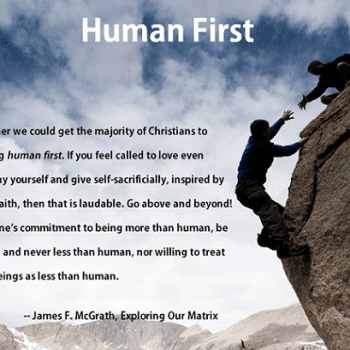In a sermon towards the end of 2015, the (now former) pastor of my church encouraged us to do what the disciples are depicted as doing in the early part of the Gospel of John: tell our story. It had been a long while since I’ve done so here, and so I thought I’d seize the opportunity. But for some reason it didn’t happen right away, and got saved as a draft post. When the Patheos Progressive Christian began getting bloggers to share their perspectives on why they are still Christians, I thought I would return to this topic and tell my story of upbringing, coming to personal faith, and remaining a Christian. I worked on it some more, but once again didn’t finish and publish the post.
Eventually, though, something prompted me to finally finish it. I found myself talking in my Sunday school class a few weeks ago about the Greeks who come to see Jesus in John 12. This inquiry of non-Jews works in the Gospel on two levels, as does so much else. Greek-speaking Gentiles (even if converts to Judaism or “God fearers”) would not be readily identifiable as such, and so would probably be suspect – are these people who are interested in Jesus because the Roman authorities are interested in him, with a view to apprehending him? This turning point in the Gospel thus makes for both a natural connection with the arrival of the hour and the prediction of Jesus’ death, but also a theological thematic one as the crucifixion-exaltation of Jesus will lead to his lordship being proclaimed to a wider world. We also talked about the shape and extent of that world in an ancient context. And we also connected with the changing view of the world that we now know is spherical, and more widely inhabited across a vaster surface than ancient peoples envisaged.
Here’s my own story’s highlights, which I’ve shared at least some of on this blog in the past. I grew up Roman Catholic, and in my teens drifted away from attendance – although not from searching for God – having found that the experience of undergoing confirmation failed to impact me personally. I was extremely confused and regularly depressed as a teenager, as I suspect most of us are, and so I’m not sure that I need to elaborate on anything to do with specific circumstances or details. Confirmation was supposed to involve receiving the Holy Spirit, I thought, and yet I felt no different.
I wrote songs about God, still seeking. Eventually, I happened across a contemporary Christian radio program (playing music by artists like Michael W. Smith, Amy Grant, and Bryan Duncan), and was struck by the way they seemed to have a reality to their faith experience that had thus far eluded me. My songs were an expression of what I felt I was looking for, not something I had found or could take for granted as part of my lived experience the way they could.
Not long after, I was invited to a concert one Saturday evening at a Pentecostal church by a friend at school. My impression of the music was similar to what I had heard on the radio, and a song with the refrain “I say yes, Lord” made a particular impression on me. I went back to the church the following morning, and at the end of the service I prayed to God, saying, “I don’t know what your way of living is, but mine isn’t working, and so whatever yours is, I want to try it.” A sense of peace came over me, unlike anything I had ever experienced.
The rest, as they say, is history. The impact was immediate. At my workplace the next day my employer made a joke about the importance of money, and I suggested that God is more important. When my coworkers asked me when I had become religious, I answered honestly: “Yesterday.” Eventually I did volunteer work on children’s camps in Ireland, which led to connections with Christians of other denominations that led me to Belfast Bible College, and to the British educational system, which led to me meeting my wife, pursuing teaching, and studying for degrees in England. Over the course of studying the Bible and theology, my views evolved. I think that, because an experience rather than a creed was at the core and foundation of my faith, I was able to feel free to seek wholeheartedly after God and after truth in a way that did not require shielding my beliefs from critical examination. I’ve said more about that part of my journey elsewhere on the blog, as well as in my book The Burial of Jesus, which resulted directly from my wrestling with the relationship between faith and history (on which subject see also Andrew Perriman’s recent post about what the application of historical methods to the Bible has to do with being a Christian).
A commenter here on the blog recently asked about my connection with young-earth creationism, and so I will also add a little about that (which I also shared in a comment in reply, but many may not have seen it there). The short version is that I was taken to hear a young-earth creationist speaker after coming to a personal faith in my teens, and accepted what I heard and incorporated it into my Evangelical worldview. I worked antievolution ideas and emphases into lots of conversations and even formal talks that I gave in my evangelistic fervor. I was also eager to learn more on the topic, and so I found the book Science and Creationism, edited by Ashley Montagu, in a public library, checked it out, and read it – and discovered that I had been lied to. And so I dropped YEC – and learned the important lesson in the process that my life-changing religious experience did not mean that everything that I heard within the circles of those who share that experience is trustworthy. I’d say that the educational value of my error and having it shown to me has been particularly helpful as I’ve sought to integrate the various components of my worldview as I’ve grown and studied further.
I recently had a sermon in my church help me formulate a specific succinct answer to the question “Why am I an American Baptist?” My answer is, because I find that it helps me to be a Christian.
Those are some of the key moments in my story. I am a Christian for many reasons, which include upbringing and circumstances, a life-changing personal experience, and the ongoing meaning I find in the challenging message of a crucified messiah. The answer to the question “Why are you a ______?” should never be answered just in terms of a past experience, however crucial that experience may have been. It needs to be answered in the present tense as well.
And so let me share my “Creed” – a song I wrote after a conversation in my Sunday school class led to reflection on how, traditionally, Christian creeds have focused almost exclusively on what people believe, and not at all on what people do.
See also Vance Morgan on why he isn’t an atheist, Zack Hunt’s post on the gulf between what it means to be a Christian and what Christians often say and do, Rob Moll on the biological basis of spirituality, Christian Century on personal relationships with Jesus, Rachel Held Evans on the Why Christian? conference, and other sources on progressive Christian identity and the defense of progressive Christian views and values.
See too:
http://www.patheos.com/blogs/templeofthefuture/2014/11/the-atheist-who-spoke-to-god/

















